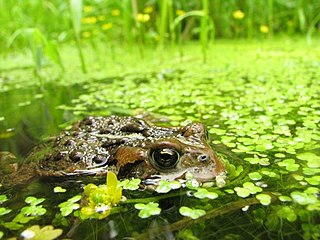
Ecology is the study of the relationships among living organisms, including humans, and their physical environment. Ecology considers organisms at the individual, population, community, ecosystem, and biosphere level. Ecology overlaps with the closely related sciences of biogeography, evolutionary biology, genetics, ethology, and natural history.
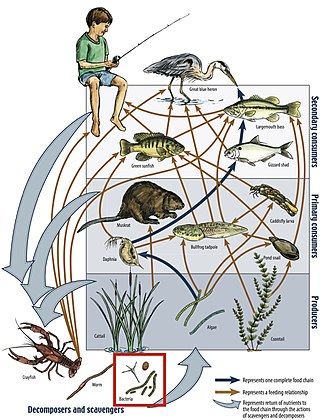
A food web is the natural interconnection of food chains and a graphical representation of what-eats-what in an ecological community. Another name for food web is consumer-resource system. Ecologists can broadly lump all life forms into one of two categories based on their trophic levels, the position it occupies in the food web: 1) the autotrophs, and 2) the heterotrophs. To maintain their bodies, grow, develop, and to reproduce, autotrophs produce organic matter from inorganic substances, including both minerals and gases such as carbon dioxide. These chemical reactions require energy, which mainly comes from the Sun and largely by photosynthesis, although a very small amount comes from bioelectrogenesis in wetlands, and mineral electron donors in hydrothermal vents and hot springs. These trophic levels are not binary, but form a gradient that includes complete autotrophs, which obtain their sole source of carbon from the atmosphere, mixotrophs, which are autotrophic organisms that partially obtain organic matter from sources other than the atmosphere, and complete heterotrophs that must feed to obtain organic matter.

Human ecology is an interdisciplinary and transdisciplinary study of the relationship between humans and their natural, social, and built environments. The philosophy and study of human ecology has a diffuse history with advancements in ecology, geography, sociology, psychology, anthropology, zoology, epidemiology, public health, and home economics, among others.

Ecological economics, bioeconomics, ecolonomy, eco-economics, or ecol-econ is both a transdisciplinary and an interdisciplinary field of academic research addressing the interdependence and coevolution of human economies and natural ecosystems, both intertemporally and spatially. By treating the economy as a subsystem of Earth's larger ecosystem, and by emphasizing the preservation of natural capital, the field of ecological economics is differentiated from environmental economics, which is the mainstream economic analysis of the environment. One survey of German economists found that ecological and environmental economics are different schools of economic thought, with ecological economists emphasizing strong sustainability and rejecting the proposition that physical (human-made) capital can substitute for natural capital.
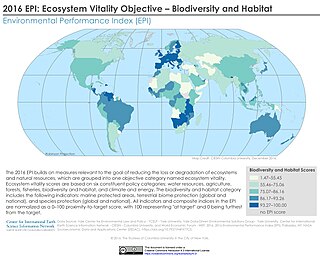
Conservation biology is the study of the conservation of nature and of Earth's biodiversity with the aim of protecting species, their habitats, and ecosystems from excessive rates of extinction and the erosion of biotic interactions. It is an interdisciplinary subject drawing on natural and social sciences, and the practice of natural resource management.
The diversity of species and genes in ecological communities affects the functioning of these communities. These ecological effects of biodiversity in turn are affected by both climate change through enhanced greenhouse gases, aerosols and loss of land cover, and biological diversity, causing a rapid loss of biodiversity and extinctions of species and local populations. The current rate of extinction is sometimes considered a mass extinction, with current species extinction rates on the order of 100 to 1000 times as high as in the past.

Ecological restoration is the process of assisting the recovery of an ecosystem that has been degraded, damaged, or destroyed. It is distinct from conservation and preservation in that it is an "attempt to co-design nature with nonhuman collaborators." Ecological restoration can reverse biodiversity loss, combat climate change, and support local economies. The United Nations named 2021-2030 the Decade on Ecosystem Restoration.
In ecology, an ecosystem is said to possess ecological stability if it is capable of returning to its equilibrium state after a perturbation or does not experience unexpected large changes in its characteristics across time. Although the terms community stability and ecological stability are sometimes used interchangeably, community stability refers only to the characteristics of communities. It is possible for an ecosystem or a community to be stable in some of their properties and unstable in others. For example, a vegetation community in response to a drought might conserve biomass but lose biodiversity.

In ecology, resilience is the capacity of an ecosystem to respond to a perturbation or disturbance by resisting damage and recovering. Such perturbations and disturbances can include stochastic events such as fires, flooding, windstorms, insect population explosions, and human activities such as deforestation, fracking of the ground for oil extraction, pesticide sprayed in soil, and the introduction of exotic plant or animal species. Disturbances of sufficient magnitude or duration can profoundly affect an ecosystem and may force an ecosystem to reach a threshold beyond which a different regime of processes and structures predominates. When such thresholds are associated with a critical or bifurcation point, these regime shifts may also be referred to as critical transitions.

Ecosystem management is an approach to natural resource management that aims to ensure the long-term sustainability and persistence of an ecosystem's function and services while meeting socioeconomic, political, and cultural needs. Although indigenous communities have employed sustainable ecosystem management approaches implicitly for millennia, ecosystem management emerged explicitly as a formal concept in the 1990s from a growing appreciation of the complexity of ecosystems and of humans' reliance and influence on natural systems.
A social-ecological system consists of 'a bio-geo-physical' unit and its associated social actors and institutions. Social-ecological systems are complex and adaptive and delimited by spatial or functional boundaries surrounding particular ecosystems and their context problems.
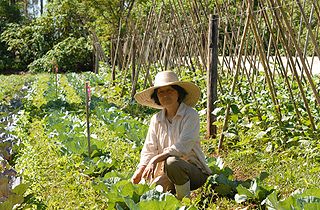
A nutrient cycle is the movement and exchange of inorganic and organic matter back into the production of matter. Energy flow is a unidirectional and noncyclic pathway, whereas the movement of mineral nutrients is cyclic. Mineral cycles include the carbon cycle, sulfur cycle, nitrogen cycle, water cycle, phosphorus cycle, oxygen cycle, among others that continually recycle along with other mineral nutrients into productive ecological nutrition.

Carl Folke, is a trans-disciplinary environmental scientist and a member of the Royal Swedish Academy of Sciences. He is a specialist in economics, resilience, and social-ecological systems, viewing such systems as intertwined and potentially unexpected in their interactions. As a framework for resource management, this perspective brings important insights to environmental management, urban planning, and climate adaptation. He suggests ways to improve our ability to understand complex social-ecological interactions, deal with change, and build resilience, often working at smaller scales as a step towards addressing larger scales.

Carl F. Jordan is Professor Emeritus, Odum School of Ecology, University of Georgia.

An ecosystem, short for ecological system, is defined as a collection of interacting organisms within a biophysical environment. Ecosystems are never static, and are continually subject to stabilizing and destabilizing processes alike. Stabilizing processes allow ecosystems to adequately respond to destabilizing changes, or pertubations, in ecological conditions, or to recover from degradation induced by them: yet, if destabilizing processes become strong enough or fast enough to cross a critical threshold within that ecosystem, often described as an ecological 'tipping point', then an ecosystem collapse occurs.
Erika S. Zavaleta is an American professor of ecology and evolutionary biology at the University of California, Santa Cruz. Zavaleta is recognized for her research focusing on topics including plant community ecology, conservation practices for terrestrial ecosystems, and impacts of community dynamics on ecosystem functions.
Elena M. Bennett is an American ecosystem ecologist specializing in studying the interactions of ecosystem services on landscape. She is currently a Professor and the Canada Research Chair in Sustainability Science at McGill University. She was inducted to the Royal Society of Canada’s College of New Scholars, Artists, and Scientists in 2017. She was elected a member of the National Academy of Sciences in 2022 and became a Guggenheim Fellow in the same year.

Ann M. Bartuska is an ecologist and biologist. She is a senior advisor at Resources for the Future and a former Deputy Under Secretary for Research, Education, and Economics (REE) at the United States Department of Agriculture and former USDA Chief Scientist.
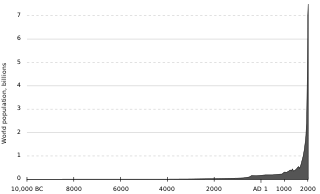
Sustainable population refers to a proposed sustainable human population of Earth or a particular region of Earth, such as a nation or continent. Estimates vary widely, with estimates based on different figures ranging from 0.65 billion people to 9.8 billion, with 8 billion people being a typical estimate. Projections of population growth, evaluations of overconsumption and associated human pressures on the environment have led to some to advocate for what they consider a sustainable population. Proposed policy solutions vary, including sustainable development, female education, family planning and broad human population planning.

Felicia Keesing is an ecologist and the David & Rosalie Rose Distinguished Chair of the Sciences, Mathematics, and Computing at Bard College in Annandale-on-Hudson, New York.